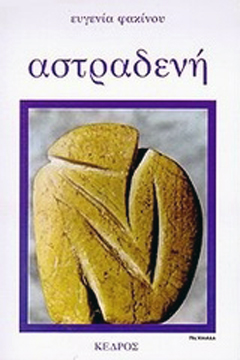The Unknown Archmage of Magic Realism
 Between long hours at the lab and a bout of lingering illness, I have let the blog go quiet for a while.
Between long hours at the lab and a bout of lingering illness, I have let the blog go quiet for a while.
However, I haven’t been totally inactive. A year ago, I wrote an essay about the fact that writers feel free to use Hellenic contexts (myths, history, location), blithely assuming they know my culture well enough to do so convincingly. In that essay, I also stated that Hellás may be home to the best magic realist alive right now: Evgenía Fakínou. As a follow-up, I wrote a brief introduction to her work, which appeared today at the SFF Portal helmed by Val Grimm. Here is the conclusion:
“Fakínou’s books are full of vision quests, awakenings, boundary crossings. All have open endings, with their protagonists poised at thresholds on the last page. At the same time, they make their readers whole by reclaiming a past that might have led to an alternative future. Fakínou is a windwalker, a weaver of spider silk. I’m sorry she is not world-famous, but even sorrier for the dreamers who will never get a chance to lose – and find – themselves in her work.”
Image: Astradhení (Starbinder), Evgenía Fakínou’s first novel.


Excellent post!
Dear Heather, I think you’d really like her! The island rituals she modified for her work are also the sources for the Koredháni mourning customs in Spider Silk.
I need to try again with “The Seventh Garment.” I admit I struggled with it, though the fault is all mine.
A good deal of the fault lies with the translation. I read the start of The Seventh Garment in English, and it rang totally false.
As I noted in the essay, most such translations range from appalling to indifferent, with a few shining exceptions (such as Karen van Dyck’s The Rehearsal of Misunderstanding, a bilingual edition of three major female poets which I was lucky enough to be assigned when I wrote for The Harvard Review). Generally, poetry fares better than prose because it tends to be translated by poets.
Your essay over at the SF Portal on her work is excellent. Her own story, as you tell it, I find as compelling as her short stories. She’s lucky to have you as her advocate.
Is she the one you mentioned to me before? You said she could be hard reading (in the sense of gritty and harsh, not in the sense of difficult)–or was that someone else?
I’m pleased you think so, Francesca! There’s more (as always), but I didn’t want the essay to become too weighed down with details.
Fakínou can be gritty, but she’s never harsh. Now I’m wondering who it was we were discussing!